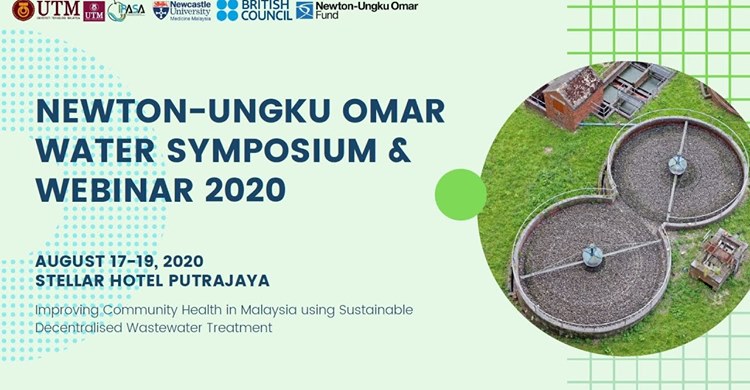Prof David Graham will be speaking at the Newcastle Alumni Day on Saturday, 10th October 2020. The lecture is open to Newcastle graduates, current and retired staff, supporters, and others; you can register here. David will discuss links between water quality and resistant infectious disease – which could potentially lead to the next pandemic. Antimicrobial resistance already is rampant in the developing world, partially due to poor water quality. However, it is growing everywhere due to global connectedness. David will present evidence of this spread before discussing holistic solutions.
UK-Malaysia Water Expert Forum “The Linkage between Wastewater, Health and Sustainable Sanitation”
Professor David Graham joins Professor Dato’ Ir Dr Zaini Ujang (Secretary General to the Environment Ministry of Malaysia) and Professor Azmi bin Aris (Director of Centre for Environmental Sustainability and Water Security, Universiti Teknologi Malaysia) as panellists and moderator for this webinar. Special thank you to Prof Dr Zainura Zainon Noor for leading the event. The webinar took place 17-19 August 2020. View day two of the webinar here.

Tackling antimicrobial resistance spread in India’s waterways
We are excited to be part of the India-UK team investigating the release of antibiotics in India’s waterways. This project fits nicely in our portfolio of ARM research projects. You can read about it in the Newcastle University Press Release or these sources: Hindustan Times, The Times of India, Deccan Herald, India Education Diary, The Times of Bengal, The Week, and India Inc.
Coverage of our Covid-19 sewage surveillance work
Our involvement in the UK nationwide surveillance programme is highlighted in a news clip on MSNBC’s The 11th Hour with Brian Williams (15 July 2020) and in a Feature article in BJM, Sewage monitoring is the UK’s next defence against covid-19, by Chris Baraniuk (15 July 2020). Additionally, our UK work is reported in Con apoyo del CONACYT investigadores crearán herramienta que ayudará a controlar la pandemia en Paraguay from the Consejo National de Cienci y Technologia (13 July 2020). This describes the development of a national sewage SARS-CoV-2 surveillance program for Paraguay.
Nationwide programme for detecting COVID-19 in wastewater
We are one of the teams on the new £1m research programme seeking to establish an early warning of future outbreaks and reduce reliance on costly testing of large populations. The research programme led by the UK Centre for Ecology & Hydrology (UKCEH), also involves researchers from the universities of Bangor, Bath, Edinburgh, Cranfield, Lancaster, Oxford and Sheffield, plus the London School of Hygiene and Tropical Medicine. Read the news releases from Newcastle University and UKCEH. This work is an extension to our UK and Spanish SARS-CoV-2 Project.
Also see:
- BBC | News | Science & Environment Coronavirus: Testing sewage an ‘easy win’ – nice article, but we did not develop the original method for SARS-CoV-2. We have improved on the previous method to make it more exact and make it more possible to approximate the human population from which it came.
- BBC | World Service | listen from 17:56
- BBC | Radio Newcastle | listen from 3:46:13
Environmental factors in the spread of drug resistance
Today David Graham and Peter Collignon released an Insights piece called Scientists around the world are already fighting the next pandemic in The Conversation. A shorter version entitled Access to clean water may be as vital as cutting antibiotic use in the fight against superbugs also was published in The Telegraph. Both articles discuss the importance of environmental factors in the spread of antibiotic resistance, especially in the developing world.
These articles comment on the just-published Technical Brief on antimicrobial resistance from the World Health Organization; Food and Agriculture Organization; and World Organization for Animal Health. The brief provides recommendations on the implementation of water, sanitation, and hygiene (WASH), and wastewater management as strategy for preventing infections and reduce the spread of antimicrobial resistance around the world. David was a contributing author on the Brief.
First virtual conference attendance
PhD researcher Amelie Ott attended her first virtual conference this May. Due to COVID-19, the Society of Environmental Toxicology and Chemistry (SETAC) Europe 30th Annual Meeting Open Science for Enhanced Global Environmental Protection was moved within a few weeks from a face-to-face meeting in Dublin, Ireland to a virtual conference (3-7 May 2020).
Conference attendees were able to watch all platform and poster presentations on demand with the opportunity to ask their questions to the presenters in a chat box. Each session had a live Zoom Q&A to allow for more in depth discussions between presenters and conference attendees.
Even though that Amelie missed the networking opportunities while enjoying a pint of Guinness after a long conference day, she was impressed by the well organised virtual conference experience and the opportunity to easily watch relevant presentations (rather than having to run switching rooms between parallel sessions). The photo below shows the virtual conference “entry hall”.
Amelie gave two pre-recorded platform presentations at SETAC, one on her PhD project talking about “Monitoring and modelling antibiotic resistance in a Southeast Asian river catchment” and the other one on a previous research project on “Multi-laboratory validation of a new marine biodegradation test for persistence screening”.
Amelie’s registration fee was covered by the Federation of European Microbiological Societies (FEMS) Meeting Attendance Grant.

Monitoring Sewage for SARS-CoV-2, the COVID-19 virus
Engineering and Physical Sciences Council (EPSRC) funds have been provided to sample and analyse sewage to estimate local concentrations of SARS-CoV-2 (the COVID-19 virus) across networks in Spain and North East England. The aim is to develop a way to quantify the prevalence of the COVID-19 infected individuals across the regions based on sewage data. If successful, this monitoring would help public health officials identify possible infection ‘hot spots,’ which captures both symptomatic and asymptomatic individuals across a community.
The project is being co-led by Professor David Graham and Dr Marcos Quintela, with their close colleague Professor Jesús Romalde in Santiago. They also will be working with water industry partners Northumbrian Water and Labaqua, which is part of the SUEZ corporation.
Welcome
The GrahAM Research Group focus primarily on work surrounding antimicrobial resistance (AMR), taking a collaborative and multidisciplinary approach to global health and well-being. The team of researchers, led by Newcastle University Prof David W Graham, utilises a holistic ‘One Health Approach’, and contributes to several of the UN’s Sustainable Development Goals (SDGs).
Our research provides guidance to various international organisations, including the World Health Organisation, and bridges sustainable development, engineering, health, and sociotechnical mitigation options for reducing global AMR.
The main topics we explore are
- the transmission, fate and impact of antibiotic resistance genes in the environment resulting from human activity;
- energy minimization in water, wastewater and solid waste management systems;
- the microbiology and ecology of greenhouse gas suppression and production in geochemical settings, especially in Polar regions; and
- water and environmental quality in the developing and emerging world.
